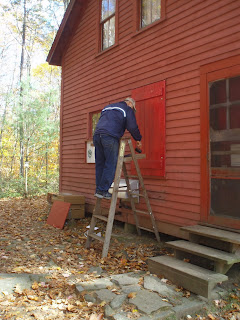 |
| Shutters ready for installation |
We were able to re-open the cabin for a few days after the National Park Service resumed normal operations after the shutdown of the Federal government ended (more on this, below).
This past Sunday, we closed the cabin for the season as scheduled.
What does this entail? If you have owned or operated a vacation home of some sort, you pretty much already know. We need to remove materials left over from the season's operations--especially things that will not survive freezing, or are attractive to mice and other small critters. The second consideration is (regretfully) securing the building and equipment from vandalism or improper use. For better or worse, the Cabin is pretty easily accessible by hunters, hikers and snowmobile riders over the winter. In the "bad old days" people would break in (typically through windows), help themselves to firewood, leave a mess behind and not treat the surroundings with respect. This has tapered off quite a bit as we've been steadily increasing the "difficulty factor" for people breaking in over the past several years.
 |
| Pete bolts on a shutter |
 |
| All buttoned up |
 |
| New shutters on front of bunkroom |
 |
| Pete wades in to disconnect the floating dock. |
 |
| Pieces get stacked above the water line. |
While things are packed away, and the interior of the cabin is inaccessible, the area is always open to visitors. Tent platforms, privies, bear boxes and cooking areas are still available and ready for use--just like other overnight sites on the A.T.
AT Committee members make regular winter time visits to check on conditions and perform ongoing minor maintenance.
 |
| Resting up for next year |
‘The Antideficiency Act prohibits federal agencies from obligating or expending federal funds in advance or in excess of an appropriation, apportionment, or certain administrative subdivisions of those funds. 31 U.S.C. §§ 1341, 1517(a). The act also prohibits agencies from accepting voluntary services. 31 U.S.C. §§ 1342." [Emphasis added].
It seems this is to prevent an agency from thwarting the intent of Congressional control by enlisting volunteers to do the work when Congress wishes the work not to take place.
While the footpath itself is pretty much impossible to close (except in more formally managed National Parks like Shenandoah or Smoky Mountains), facilities such as Upper Goose Pond Cabin (which is owned by the Park Service) are closed--even if staffed by volunteers.

No comments:
Post a Comment